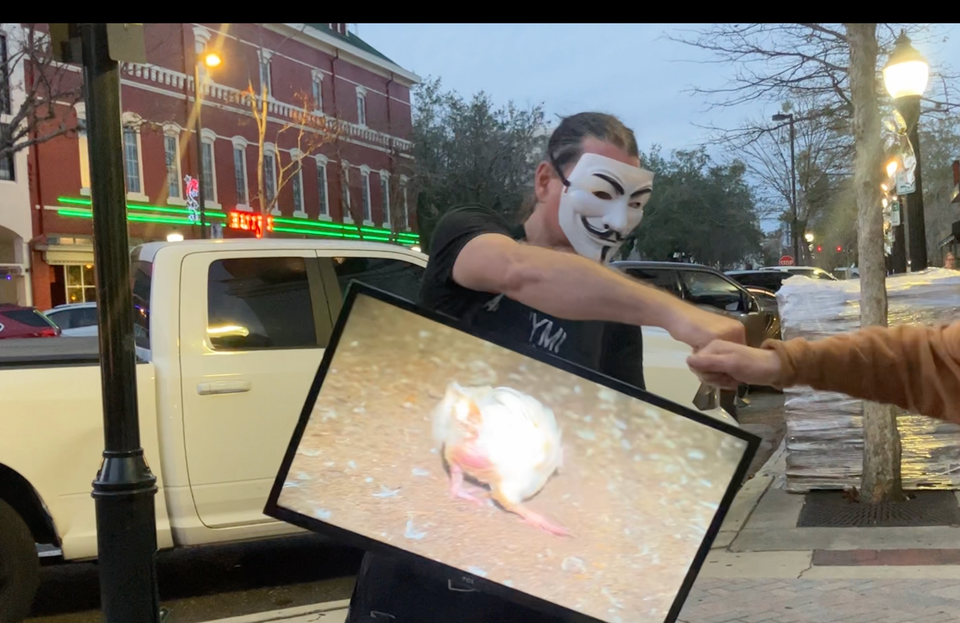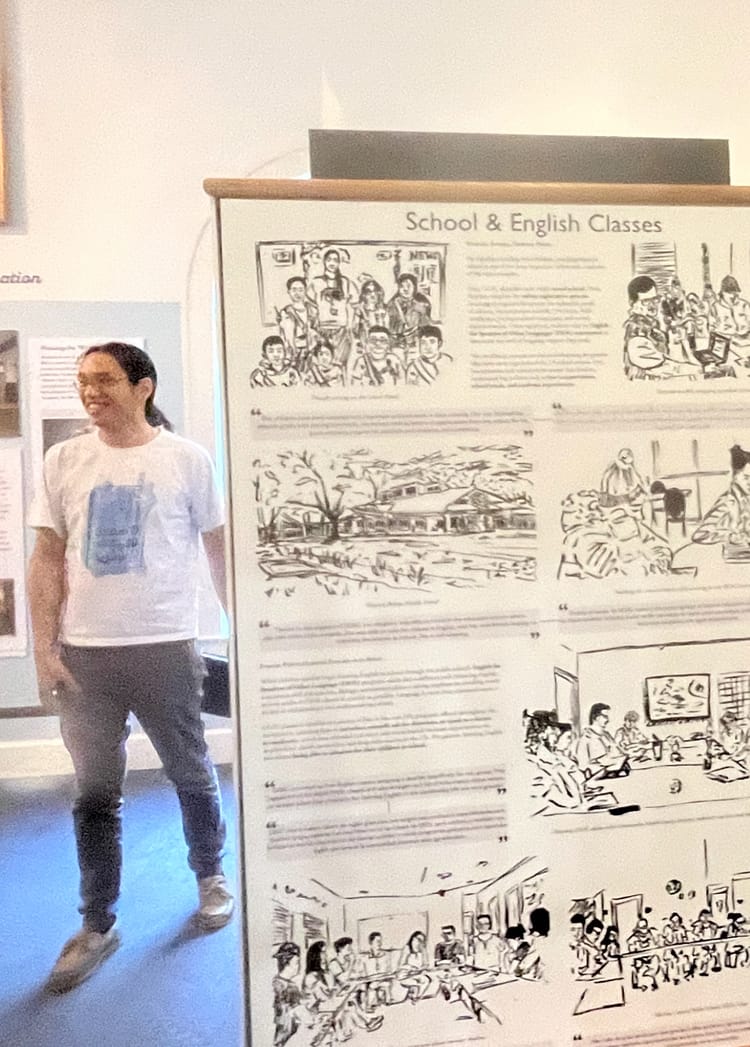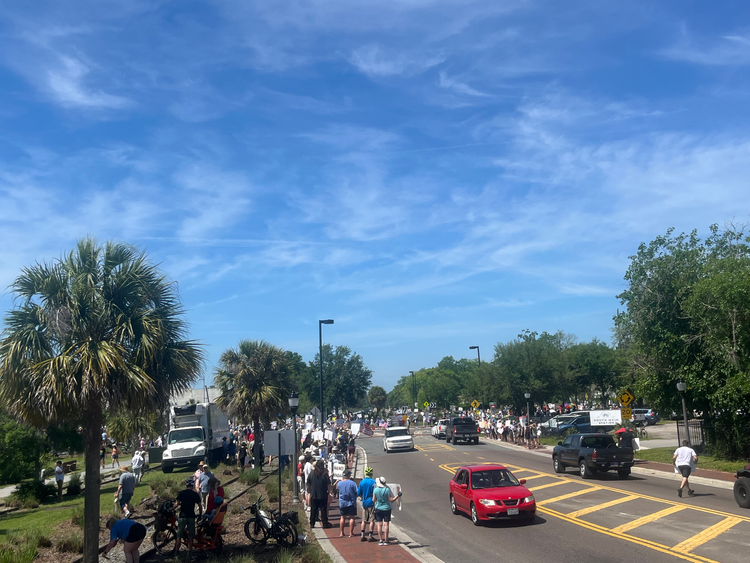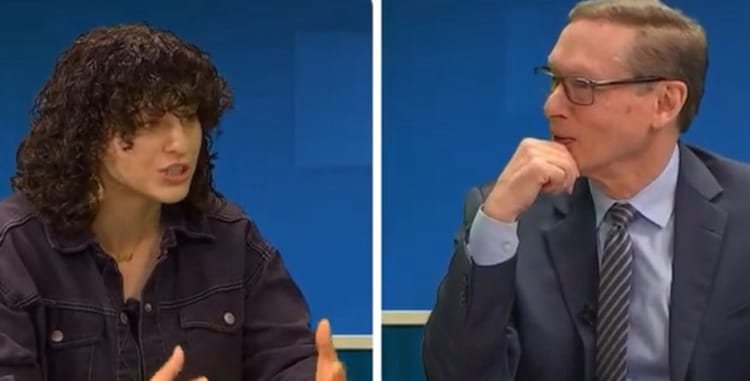Anonymous for the Voiceless Campaigns for Animal Rights Downtown

On January 27th, at 6:00 p.m., animal rights organization Anonymous for the Voiceless attracted attention downtown as they campaigned for animal rights by displaying videos of slaughterhouses and laboratories around the world using a TV screen attached to a man wearing a mask.
Anonymous calls this protest “the cube of truth.” Outreach member Garrett Betke spoke with members of the public who had questions about the display, telling them there is a need to move away from animal-based diets and move towards plant-based diets due to the effects of the animal agriculture industry.
I got the chance to interview Betke about Anonymous’ goals, motivations, and proposed solutions. The man holding the TV screen chose to take off his mask and answer questions for the interview, saying he’d go by “Anonymous."
Q: What are you guys all about?
Betke: What we do is show people what happens in the animal agriculture industry. So like, meat, dairy, eggs, leather. Industries like fur, animal testing, zoos, etc. We try to bring the animal rights message to the people, and we've introduced animal rights in the form of a vegan message. Being vegan in itself, there's a common misconception that it's just a diet that involves not eating any animal products, but really, it's an ethical stance against the animal agriculture industries, and it especially involves boycotting them because when you buy animal products, the industry is going to think that this is what you want to happen to these animals. If they keep making money off of it, then they're going to keep doing it. It's all about supply and demand.
Q: Why are you protesting here? Is there something specific in Alachua?
Anonymous: No one specifically in Alachua, I'm going to say, is worse than the rest. I would say the multinational industries—the real big ones—that are going to run concentrated animal feeding operations (CAFOs). They bought out mom & pop. Remember Live Aid in the 80s?
Q: I wasn't alive in the 80s.
Anonymous: There was this thing on MTV called Live Aid, and they're like, "Hey, we're going out of business; there's no farms; there's no food; we need help." So they would do these benefits; you know, Queen would play and shit. It was pretty cool. They all went out of business. They were bought up by these multinational firms, and then they started doing these enormous CAFOs. There are tens of thousands of animals in them. Factory farming didn't really exist before that. It's made it worse for everybody. Even if we got rid of that, we still have the problem of enslaving, murdering, and impregnating animals against their will, and it's killing the planet; it is killing people.
If you could tell somebody, "Hey, I can tell you what's going to kill you and how you're going to die in the future," Then just show it to them in a crystal ball. Half the people you see here are going to die because of what they ate. They're going to have heart attacks; they're going to get hypertension; they're going to get diabetes; and they're going to get cancer. We know for a fact that it's food causing this because of a study in China. This study can never be recreated. China was keeping records of everybody. Their age, their gender, their weight, their health, etc. Every village was required to do this. As they became westernized and industrialized, they started to get refrigerators and animal products. Their records continued, and you can watch a nation of a billion people get Western health problems that didn't exist before. You can watch their weights go up. You can watch their diabetes go up. You can watch their heart disease go up. Right there in the numbers.
Someone took all of this data and put it in a big book called "The China Study." It stands on its own as a scientific study. Except you can't recreate it because it would be completely unethical. You could watch it happen in the study, village by village, because not all of China industrialized at the same time. They did it little by little, and every time a village did it, you had the same exact result in that village, and you're going to have the next one. So you have many samples to the point where now you have thousands of samples, and the same things happen every time.
Q: Does this have any correlation to anything that's currently happening in Gainesville?
Anonymous: There's a slaughterhouse right here in Gainesville. All those cows that we see down there on Archer Road. When they're about one year old, they're going to get walked across the street and put through a slaughterhouse. I know a cow that made it out of there. The student got to know this cow as an individual. The student rescued him. He's up at a farm sanctuary just north of Gainesville now. He's an ambassador of his breed. He has a personality. He has a name. He has friends. He has a family. He probably knows more people than I do at this point.
Every time somebody meets these animals, the vast majority of people are going to feel the same way about them as they do about dogs and cats. You just haven't met a cow. You haven't met a pig. You haven't made that connection. We're taught from a young age, "They're not intelligent." "They're not sentient." "They're not awake." But they are. I have cow friends. I have pig friends. They have social lives; they have cow drama; they have clicks, friends, and families. When you separate a calf from its mother, it's traumatic. Even the hardest farmers don't like that. They'll complain about that. The calf will scream for days, and it's heartbreaking.
That is happening in Gainesville; it happens everywhere. All of these restaurants. Every grocery store in Gainesville is filled with animal products, and the demand is coming from this city and from every city. When we create that demand, a slaughterhouse in Oklahoma is going to fill it. If we say that we don't want to see how this happens, they're going to ratchet it down right down to the cheapest way they can do it.
We believe strongly that if the public could see what goes on, if that slaughterhouse had glass doors, they wouldn't participate in it. So that's why we're out here. We're showing them that this is what you're participating in when you consume animal products. You're a direct participant in this. This isn't something that is for you.
And to offer people alternatives. We don't just come out here and say, “You shouldn't do this.” I can tell you what you can do instead.
Q: What should we do instead?
Anonymous: There is a galaxy of food that isn't this stuff. This isn't even food. It's murder; it's death. Especially the standard American diet, which is making everybody sick and overweight, diabetic, cancer, etc. People are eating sugar, salt, and fat. This is introduced to them at a young age. Their pallet is completely brought up around it. By the time they make their first decision about what they're eating, they're probably about 12 years old, and they've never known anything back before they can remember anything. They're just going to continue on that path and never actually make a conscious decision about the industry that they're participating in.
Sometimes, for these people, it never actually occurs to them that they've been doing this, and they do it every day of their lives. We're out here just informing these consumers, "Hey, this is what you're participating in, and you get to make a decision about whether or not you want to do that.
Q: What was happening on the screen with the monkeys?
Betke: That was a science experiment. It's mainly for cosmetics and medicine, especially medicine. For example, with the brain chip that Elon Musk has been making, he's been testing it on monkeys. That's just one example of how monkeys and other animals have been used for testing with technology and for human implants and medicines.
Anonymous: It's unethical. They're conscious, and they're intelligent creatures closely related to humans, not that it would be okay to do it to a cow. They're taking these intelligent creatures and walking them up and experimenting on them, and it's really predatory. It's just because they can't stop us from doing it because they can't speak. They are the voiceless; we're their voice. We're telling people it's not okay to breed them into existence by forcefully raping their parents. Enslaving them for their entire lives. Testing whatever on them—all kinds of horrific experiments. People think that we're better than that. But are we? If we're still doing that, how can we say that we're an evolved people?
Q: How can we stop experimentation like that?
Anonymous: The corporations are amoral. It's not that they're immoral; they're amoral. They really only care about profit. I know somebody, and he used to do this right here on this corner. He has a PhD, and he's developing methodologies for laboratories that don't use animals to do the same tests, and they're cheaper. The corporations themselves aren't going to fund those studies; they don't need to, but if somebody else funds that study and the government approves that study, now that can be offered to corporations, and they're just going to take whatever is the best decision for their own business. They can say, "Well, this is cheaper, the results are better, and hey, now I can put 'no cruelty' on the bottle." We're not trying to destroy a business; we're trying to get them to change how they create.
Q: How can they change the way they create their products to be sustainable and ethical?
Anonymous: Well, there is no ethical use of animals because they can't consent. Every time an animal is used in the market, it's exploited, murdered, and suffers. Our approach is a complete prohibition of all animal products and the use of animals, period. They are simply other inhabitants of the earth. They're earthlings like us. They're our peers. We're not talking about the ethical use of animal products. We're talking about simply no longer using them, period. And replacing them with non-animal products, and the time is here. This is barbaric. We're in the 21st century. We can do better than this. I can show you better food than this. It's better for you. It tastes better. It's not going to get you sick. It's not going to get them sick. It's a win-win-win all the way across the board.
Q: How do we get from our society right now, which consumes vast amounts of meat, to a society that consumes no meat?
Anonymous: It's a slow cultural change. It's picking up a lot of speed. In the 1970s, there really wasn't any such thing as a vegan. They called it a strict vegetarian. Now, we're at 3% of the market. Now the Fortune 500 is already on board. You see mainstream vegan products at Walmart. You see them at Target. We have to show them the money, and we have to do that based on consumer demand. Though a lot of people don't really feel it, they actually command corporations. We tell them what to make for us, and we vote for that with our dollars every time we make a purchase. As culture changes, that economic pressure is going to be put on the corporations, and it's their job to adapt and to offer products that the public considers acceptable... You have to make meat obsolete.
I met a guy who was actually involved in building the internet. I think it was [1991] or something. He was telling people everybody was going to have a computer, even your grandmother, and everybody laughed at him. They said, "You're never going to talk anybody into that." He didn't. He gave people a better alternative to what they could get, and the world changed itself. Office buildings went and just tossed their filing cabinets, and they put it all on a computer. No one had to talk them into it. We need to come up with better products.
Q: A lot of complaints that people sometimes have about vegan products are that they're pricey. Is what you're proposing affordable?
Anonymous: If this wasn't subsidized, we couldn't afford it. Part of this is political; we've got to put pressure on Washington to stop subsidizing animal products. If they didn't, a hamburger would cost $20, and people would naturally start to put pressure on the industry to lower that price. People don't go to, say, Taco Bell for vegan food, right? They go in there just to get a taco. Someone took their taco, and they brought it to a laboratory, and they found out that it was mostly oatmeal. Does anybody in the Taco Bell drive-through really care if it's oatmeal or not? No. They just wanted something that tasted good.
Betke: It honestly depends on what you buy, because if you're going to a really fancy vegan restaurant or something, that's going to be pricey for sure, but depending on what kind of diet you have, like, for example, if you eat a whole foods plant-based diet and buy mostly things like rice, beans, and potatoes, it's going to be more affordable. Not to mention you could look at the expense from an ethical perspective too, because when you watch this footage and look at this through the eyes of an animal, an animal's life has to be worth far more than just paying an extra dollar for a burger or something.
Anonymous: Yeah, there is that. We could do a lot of things cheaper if we just discarded ethics. You know, there's a real cost to this. When you're putting this into your body, this is what you are; you are what you eat. Not in some metaphysical sense—suffering, death, cortisol—it is all through this meat when they're getting killed. You're ingesting those hormones and antibiotics. There's a price for this to pay down the road. The corporations that fed this to you, prions [disease], for example, if you've ever heard of those.
Q: What is that?
Anonymous: Prion diseases are misfolded proteins, and they're largely found in animal products, especially in factory farming. What happens is that you've got a misfolded protein, and it does a catalytic-type reaction with other proteins. When that misfolded protein touches another protein, that protein misfolds too. What it's doing is turning parts of the inside of your body to mush. You can look these up. It's called prions.
You know deer wasting disease for the deer hunters right now? Once you ingest this, it's 100% fatal. There's no cure for it at all. But it won't show up for 20 years. The farm that sold that to you is never going to be held accountable for it.
Q: So, are we all screwed?
Anonymous: Well, we don't know yet. I really do think that a lot of dementia really is just a prion disease. If they mentioned that half the country had prion-related dementia, it would be scandalous for some major corporations. So they're not going to really talk about that.
If you talk to hunters, they'll tell you right now that there are deer that are running around the woods that look like zombies. They have prion diseases. They just go, "Well, we just don't eat the ones that look like that." Well, the ones that don't look like that got it too. You know, they just haven’t advanced yet when you eat them.
Q: It lies dormant for a while?
Anonymous: It's going to start right away. It's just for it to get to the amount of protein it needs to ruin your body. It's going to take a long time.
Q: Would you like to call out any specific corporations?
Anonymous: All of them. Every single one worldwide. Especially those who say they're doing things ethically. Fairlife Farms down in South Florida. They claim they call themselves the model of the industry, and they have this storefront-type thing where you can see all these cows, and it's practically a Disney-like environment, right? Someone went to work there undercover and got the real deal, and the back of it was horrific. It was as bad as any of this stuff. Anytime any corporations come up to you and tell you, "Oh, we don't do it that way," Bullshit. They all go to the same slaughterhouse. There's no special slaughterhouse. Yeah, there are some cows that you can see up on I-75 that aren't on a factory farm, and they're in a grassy area. Farmers will tell me, "We love our cows; they only have one bad day." Okay, would you put your dog down like that? If it's just one bad day?
Q: In a definitive statement, what is your goal?
Anonymous: Our goal is the end of animal exploitation in our lifetime.
Betke: And to lead as an example, so we can push towards that society, so we can lead people towards that specific future.
Anonymous: The idea about Anonymous is that we're nobody; we're nothing. I'm not important. Who I am is not important. It's the message that's important.
For more information about Anonymous for the Voiceless, their website can be found here.




